The short-term rentals (STR) market has been expanding rapidly in recent years, with popular vacation rental platforms like Airbnb, Booking.com, and VRBO transforming how people travel and lodge. As this industry progresses, property owners and managers constantly search for ways to improve their operations and outpace their competition. Artificial Intelligence (AI) is one of the crucial catalysts for this innovation: It has enormous potential to revolutionize various facets of vacation and short-term rentals.
To better understand how AI contributes to the growth of short-term rentals, we spoke with businesses involved in AI in the STR industry and included their opinions throughout this article. We will explore prominent use cases, practical examples, and available AI tools that property owners and managers can leverage. From dynamic pricing and revenue management to personalized guest experiences and optimization of property management, AI is laying the groundwork for smarter and more efficient vacation rentals.
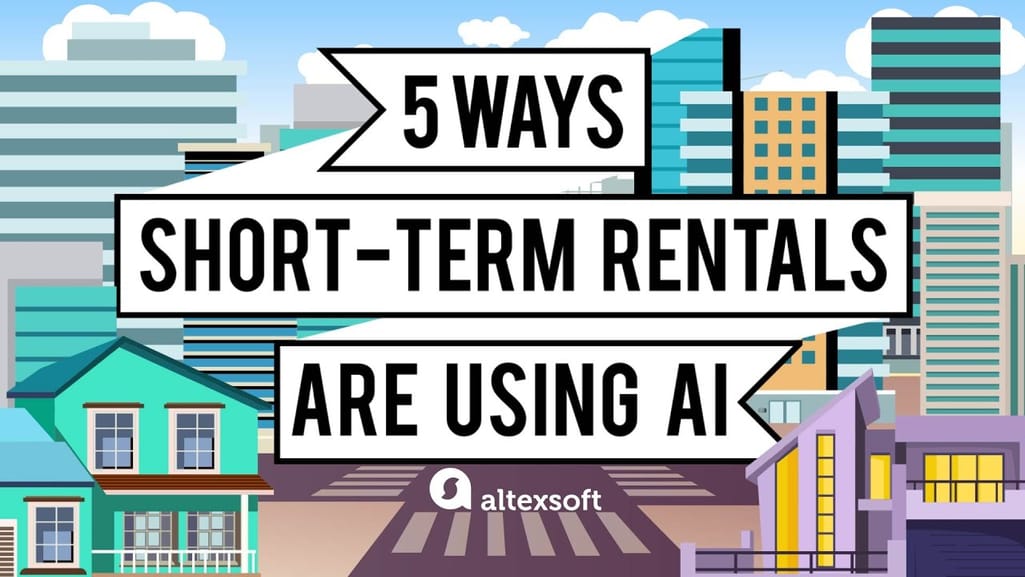

How AI shapes short-term rentals in our 10-minute review
Understanding AI and its role in the short-term rental industry
To comprehend the impact of AI on the vacation rental industry, it is crucial to understand AI in general, the role it plays in the short-term rental market, and the benefits of adopting AI in the vacation rental industry.
AI in a nutshell
Artificial Intelligence (AI), at its core, is a branch of computer science that focuses on developing algorithms and computer systems capable of performing tasks that typically require human intelligence. This includes learning, reasoning, problem-solving, perception, language understanding, and decision-making.
The key terms that everyone should know within the spectrum of artificial intelligence are machine learning, deep learning, computer vision, and natural language processing. It’s worth defining them to move forward on the topic.
Machine Learning is a subset of AI involving the design of algorithms that enable computers to learn patterns within historical data and make predictions or decisions based on new information.
Deep Learning is a subset of machine learning that focuses on building complex algorithms named deep neural networks. These networks can assimilate intricate patterns and representations from vast amounts of data. Their existence has enabled important breakthroughs in image and speech recognition, natural language comprehension, and game playing, which makes them an integral element of various AI applications.
Head over to our dedicated article about AI, machine learning, and deep learning to find out more about the differences.
Computer Vision is a multidisciplinary field that deals with teaching computers how to interpret and comprehend our world’s visual information. By analyzing digital images and videos, these algorithms can identify objects, track movement, and even create 3D models of scenes.
Natural Language Processing (NLP) is a crucial branch of AI that concentrates on connecting computers and human languages. It involves designing algorithms that can interpret, scrutinize, and generate human language in a meaningful and valuable manner. The field of NLP has an array of uses that include developing sentiment analysis, facilitating the process of machine translation, and creating conversational AI agents and voice assistants. It is indispensable for empowering computers to comprehend, respond to, and interact with humans in their natural language.
The role AI plays in the short-term rental market
AI is being increasingly integrated into the short-term rental industry, transforming how property owners and managers operate their businesses.
One of the key areas where AI has made a significant impact is revenue management and dynamic pricing. AI-powered pricing algorithms can analyze factors such as historical booking data, seasonal trends, local events, and competitor pricing to recommend optimal nightly rates for rental properties. For instance, AristanderAI, a Berlin-based deep learning company, focuses on pricing systems in the travel industry by utilizing AI and machine learning techniques to help businesses in the short-term rental space make better pricing decisions. Another example, Beyond Pricing, has demonstrated success in enabling property owners to maximize revenue and occupancy rates while maintaining competitiveness in the market through their AI-based dynamic pricing platform.
Another area where AI is making strides in the STR market is in guest experience management. According to “Hospitality in 2025: Automated, Intelligent…and More Personal” research by Oracle and Skift, over half of the executives responded that they’ve already implemented automated messaging for customer service requests or are experimenting with it. More than one-fifth said they'd consider it in the next year.
The AI chatbots can handle many customer inquiries, providing instant responses and support 24/7, leading to a more seamless and efficient guest experience. Furthermore, AI can also be used to personalize guest experiences by analyzing their preferences and behavior to recommend tailored services and local attractions.
Additionally, through predictive analytics and smart home technology, AI can identify potential maintenance issues before they become critical, allowing property managers to address them proactively. This reduces the risk of guest dissatisfaction and helps prolong the lifespan of property assets.
So as far as the penetration of AI technologies into revenue management goes, a significant shift is happening. Gernot Zechner, Head of Operations and Senior Consultant at AJL Atelier, comments, "On the one hand, we talk about an industry that still uses seasonal pricing, which should obviously cause a dramatic performance improvement. However, recent developments also show that dynamic pricing solutions from a few years ago are at risk. It is like comparing Alexa or Siri to new voice-based algorithms powered by large language models. The performance difference is not just a few percentage points but more likely a multiple in profit uplifts."
We’ll cover these and other use cases in more detail further on. Now, let’s discuss the advantages of using artificial intelligence in the STR business.
Benefits of adopting AI in the STR industry
There are numerous benefits of integrating AI technology into the vacation rental industry, and they can be broadly categorized into three areas: efficiency, revenue optimization, and enhanced guest experience.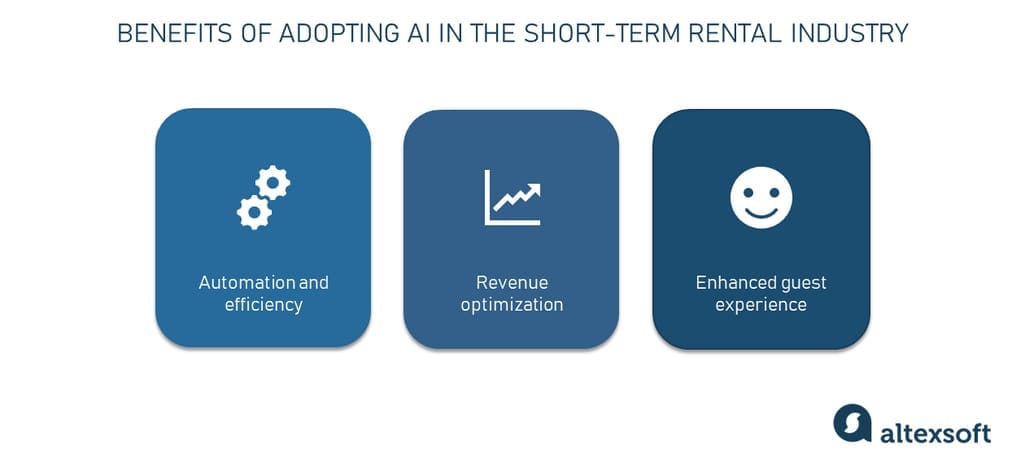
Key opportunities of adopting AI in the STR sector
Automation and efficiency. AI-powered systems can automate various time-consuming and repetitive tasks, such as guest communication, and property management. This frees up property owners and managers to focus on more critical aspects of their business, such as marketing and guest relations.
Revenue optimization. As mentioned earlier, AI can significantly impact revenue management through advanced dynamic pricing algorithms. Property owners can maximize their revenues by setting optimal pricing based on real-time market data and ensuring their properties remain competitive.
Enhanced guest experience. AI can help provide a personalized and seamless guest experience, which is critical in the highly competitive vacation rental market. From instant support through conversational agents to tailored recommendations, AI can significantly improve guest satisfaction and encourage repeat bookings.
As technology continues to evolve and become more accessible, it is essential for property owners and managers to adopt AI solutions to stay competitive and capitalize on the numerous benefits it offers.
So what businesses will benefit the most from adopting AI?
“The early adopters, plain and simple.” answered Roy Firestein, a co-founder and CEO at Autohost.ai — a short-term rental property management platform that leverages artificial intelligence and machine learning to automate tasks such as guest screening, pricing, and communications: “Every company in the industry will start to gain many benefits if they adopt AI early. It’s not like one type of vendor or the category of vendors in the industry will start to gain more: It will be companies with good product leadership and clear company vision.” He also added, “Companies that are late to pick up and experiment with and apply some sort of AI in the products will be left behind.”
Key use cases of AI in the short-term rental industry with real-life examples
The short-term rental industry is rather new to leveraging the artificial intelligence power. But there are already truly impressive results that are quite impressive.
Adir Ron, an CMO at Duve, shares their opinion on this, “Up until now, it felt as if the fastest adoption of AI tech happened in the travel industry — with smart trip planners, price comparisons, and other interesting use cases happening on the Marketplace and OTA side. However, it now starts shifting in the hospitality industry, too — with more independent vendors in the space offering AI capabilities inside core products like guest experience, check-in, guest comms, review management, or upselling.”
So this section will explore some of the key use cases of AI in the industry, along with real-life examples of these technologies.
Revenue management and dynamic pricing
One of the ways for short-term property owners and managers to optimize their operations and ensure their properties remain competitive is by using AI in their revenue management strategies.
Revenue management in the short-term rental business refers to the process of maximizing revenue and occupancy by strategically setting prices and adjusting them based on supply and demand, market trends, and other factors. The latter is known as dynamic pricing.
Revenue management requires thorough data analysis and evaluation of aspects like booking patterns, occupancy rates, and competition to identify opportunities for revenue enhancement. The objective is to determine the most suitable price for every unit at specific times. This could involve modifying rates for particular dates or occasions, creating discounts, or setting minimum stay requirements.
When it comes to AI-powered tools, they can forecast demand and automatically adapt pricing based on real-time market data. This eliminates the need for manual adjustments and ensures that property owners and managers stay on top of market trends and fluctuations. Additionally, AI-driven solutions can detect patterns and correlations in data that may not be immediately evident to humans, allowing for better pricing strategies and increased revenue opportunities.
One example of implementing AI technology in its platform is AristanderAI — a Berlin-based deep-learning company specializing in pricing systems for the travel industry. Already trusted by several major European airlines, the company has shifted its focus to the STR industry, conducting 12-week pilots with property management companies of various sizes.
We talked to Arne Reichelt and Marco Velten, founders of AristanderAI. Here’s their comment: “Similar to the airline sector, we leverage the latest findings in machine learning to help short-term rentals evolve from legacy IT to future-ready tech. Revenue management teams can anticipate future demand more accurately, and therefore predict the optimal pricing model for their entire portfolio — across all channels, in real-time.”
AristanderAI uses AI techniques like deep learning, image recognition, and NLP to transform complex data into actionable insights for improved pricing decisions. They connect to such data sources as social media posts, news articles, customer reviews, and property images.
AI-powered personalization and recommendations
AI-powered recommendation systems enhance the guest experience in the STR industry by analyzing guest preferences, booking history, and other data to provide personalized recommendations for accommodations, activities, and services. These systems employ machine learning and natural language processing (NLP) techniques to understand user preferences, search queries, and interactions with the platform. Based on this information, they generate tailored suggestions that cater to each guest's unique needs and interests.
Duve is an AI-powered platform that delivers personalized recommendations and services to guests staying in short-term rental properties. By gathering data such as booking details and guest preferences, Duve creates comprehensive guest profiles. The platform uses AI algorithms to analyze guest profile data to generate personalized recommendations based on their preferences and interests.
Adir Ron, an CMO at Duve, explains, “The principal value that Duve customers see is in cutting down barriers between host and guest and empowering hosts to focus on a personalized touch. Our current use cases revolve around three areas for now. They include auto-generating guest app content to match specific guest personas and interests, intelligent summarization and AI prioritization of incoming guest comms to better serve the most urgent cases, and intelligent auto-replies and semi-auto suggestions for guest inquiries to reduce incoming calls and improve guest satisfaction.”
Property managers can use Duve’s platform to send tailored messages and offers to guests through different communication channels. The solution provides a centralized hub for managing communication, property access, and on-demand services. As guests interact with the platform, Duve's AI algorithms continuously learn and refine their recommendations, ensuring that future suggestions are relevant and engaging.
Remote property inspection
AI-powered remote property inspection solutions employ image recognition and computer vision technologies to inspect and monitor short-term rentals at a distance. By analyzing images and videos, these systems assess property conditions, identify maintenance issues, and ensure safety and quality standards compliance. This reduces the need for on-site visits while maintaining high-quality standards across property portfolios.
Paraspot is an AI-powered solution for remote property inspection in the STR industry. It basically eliminates the need for a physical visit.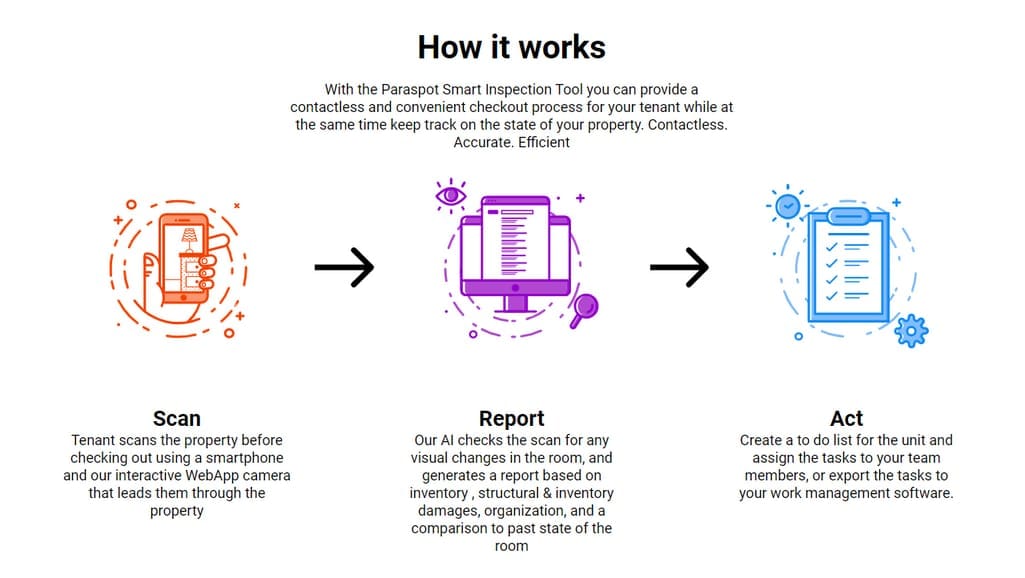
How Paraspot’s AI-driven property inspections work. Source: Paraspot
By leveraging computer vision and machine learning algorithms, Paraspot analyzes images and videos of properties to detect problems such as damaged furniture, water leaks, and cleanliness concerns, allowing property managers to address these issues promptly and maintain the quality of their properties.
Yakir Saadia, a Сo-Founder and CEO at Paraspot AI, says, “We integrate AI throughout the entire property inspection process. This includes the technical aspects, inventory management, and evaluating the property's condition. Furthermore, our AI assists guests with the scanning procedure and is implemented in numerous other areas as well.”
Paraspot's AI-driven inspections enhance accuracy and consistency compared to traditional manual inspections. The AI system reduces the instances of human error and subjectivity, ensuring a more reliable evaluation of property conditions. This ultimately leads to better-informed decision-making and more effective resource allocation for property maintenance and repairs.
Property management optimization: AI-powered smart home technology
AI technologies can simplify property management by automating tasks such as scheduling cleaning and maintenance, generating utility invoices, and optimizing energy usage. Moreover, AI facilitates booking management by synchronizing calendars across different platforms, preventing double bookings, and automating guest communication for check-in and check-out instructions.
In addition to this, AI systems provide real-time insights into various aspects of operated properties. For instance, smart sensors can track environmental factors such as temperature, humidity, and air quality, empowering property managers to make informed decisions about energy usage and indoor comfort.
An exemplary company that focuses on improving property management in the short-term rental industry through the use of the Internet of Things (IoT) and smart home technology is Operto. AI-powered devices and sensors collect data on the property's energy consumption, temperature, and security. Machine learning algorithms analyze this data to automate maintenance tasks, optimize resource allocation, and provide recommendations.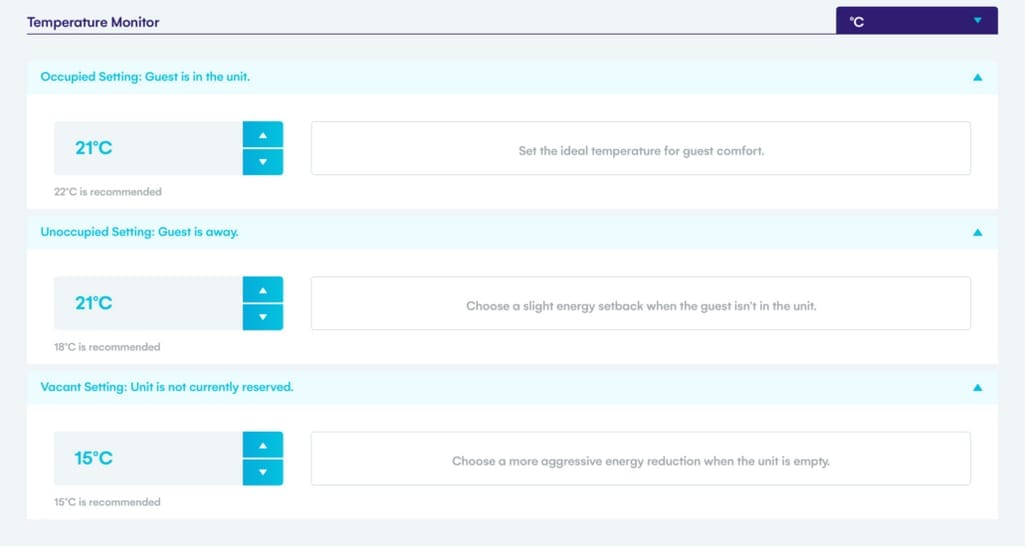
Operto’s temperature monitoring dashboard with automated suggestions. Source: Guesty
Operto's platform also offers keyless entry solutions to simplify check-in and check-out processes for guests while reducing the time and effort spent by property managers on coordinating key exchanges.
AI-driven risk management
AI-driven risk management and security is a rapidly emerging use case in the short-term rental industry, providing property managers and owners with tools to safeguard their properties, minimize potential liabilities, and maintain a high standard of the guest experience. With AI in their pocket, these solutions can analyze vast amounts of data to identify potential risks, assess vulnerabilities, and implement preventive measures.
AI-powered guest screening allows for analyzing various data points, including guest information, booking details, and historical behavior patterns. By evaluating these data points, the system assigns a risk score to each reservation, helping property managers and owners make informed decisions about accepting or declining bookings, or applying additional security measures. As more data is gathered and analyzed, the AI-driven platform continuously improves its risk assessment model, ensuring reliable and accurate results.
Fraud detection and prevention. By analyzing patterns in booking data, payment information, and guest behavior, AI-driven systems can detect potential fraud cases, such as fake bookings or chargebacks. These insights enable property managers and owners to implement appropriate countermeasures, such as requiring additional identification or verification steps, ultimately protecting their revenue and reputation.
Autohost.ai is a security solution for hospitality providers, focusing on scanning, inspecting, and ranking reservations to identify potential risks. By using AI, the company aims to offer a more efficient and unbiased approach to customer screening in the short-term rental industry.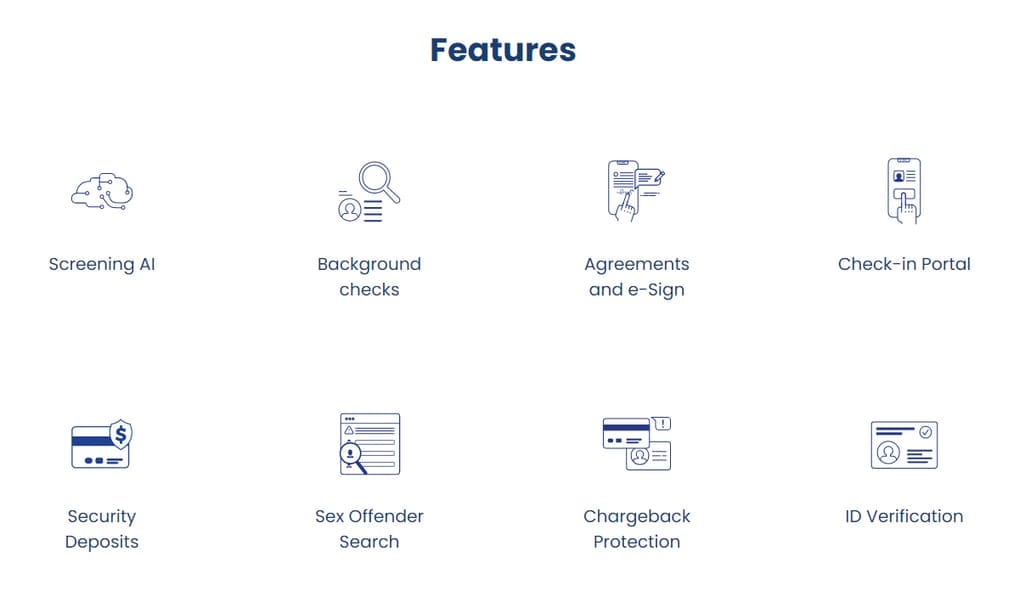
Features provided by Autohost. Source: Autohost
Autohost.ai co-founder Roy Firestein shares, "Autohost's goal is to develop and apply advanced technology to create ethical screening solutions that benefit businesses globally. Our AI-driven approach makes the screening process more efficient by replacing individual judgment calls and their inherent biases, as well as the manual work involved in gathering and analyzing information. The technology is adept at identifying false information, detecting scams, and other risks. It scans potential customers and assesses their suitability for booking a stay."
Through robust AI-driven screening measures, Autohost.ai verifies guest's identity and payment information, preventing fraud, which can result in costly chargebacks from credit card companies. The system analyzes various data points, including booking history, online presence, and behavioral patterns, to assess the risk level associated with each reservation.
Predictive maintenance of properties
AI-driven platforms also help property managers and owners proactively address potential maintenance issues before they escalate into costly problems. AI can predict when equipment or infrastructure might require maintenance or replacement by analyzing historical data, current conditions, and usage patterns. This allows property managers to schedule repairs or replacements at the most opportune times, minimizing downtime and improving the overall guest experience.
SmartRent is an IoT and property automation platform that employs AI for predictive maintenance in the short-term rental industry. It offers property owners and managers greater control, visibility, and insight into their properties' maintenance needs.
The platform integrates various IoT devices, such as smart appliances, sensors, and thermostats, continuously gathering data on the property's temperature, humidity, and equipment usage patterns. Then SmartRent's AI algorithms analyze the collected data and detect correlations, trends, and anomalies that may imply potential maintenance issues. For instance, the system may recognize an unusual increase in energy consumption, indicating that the HVAC system may need maintenance. Finally, the platform generates predictive insights from the analyzed data, enabling property managers to anticipate maintenance problems before they happen.
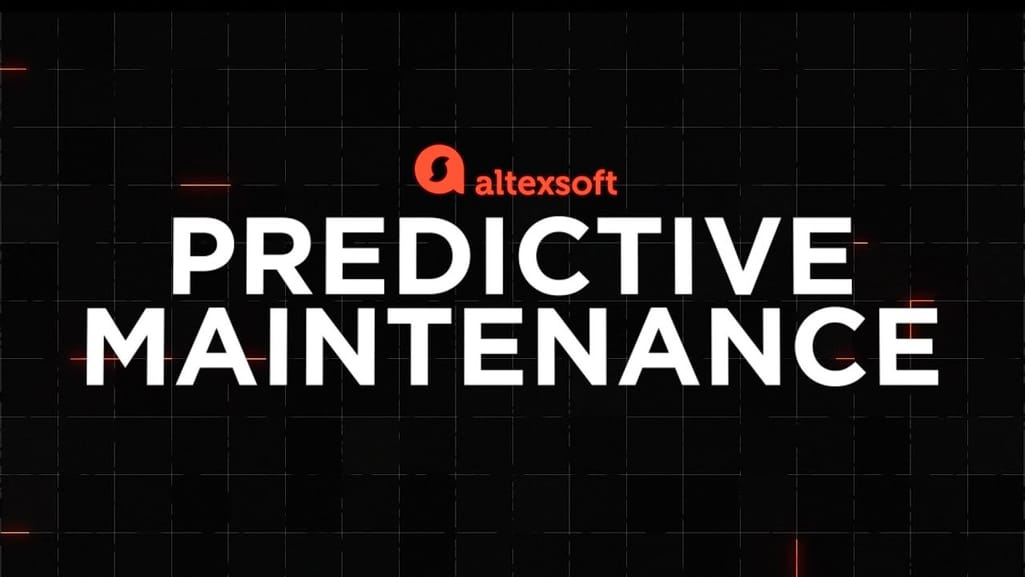

Check out our video explaining what predictive maintenance is and how it works
For example, the platform might predict when an air conditioning unit will likely fail or when a water heater requires replacement, allowing property managers to schedule repairs or replacements at the most convenient times.
Conversational AI for customer support and inquiries
Conversational AI, which includes chatbots and virtual assistants, leverages natural language processing and machine learning to understand and respond to user inquiries in a human-like manner.
In the STR industry, these AI-powered chatbots can effectively manage a wide range of customer support tasks, such as
- booking assistance — helping guests during the booking process by answering queries related to property availability, rental rates, and payment options as well as guiding users through the reservation process;
- property information requests — providing detailed information regarding properties, such as the number of bedrooms, amenities, local attractions, check-in/out times, pet policies, and any special requirements or restrictions;
- handling common issues during a guest's stay — identifying and resolving minor issues or complaints, either by providing relevant information or escalating the issue to human support agents for assistance; and
- upselling and cross-selling — recommending additional services, such as airport transfers and guided tours, to enhance the guest experience and generate additional revenue for property owners.
ChatGPT by OpenAI leverages advanced language models to generate contextually relevant responses to user inquiries. By processing user input, understanding the intent behind questions, and generating accurate responses, it can provide instant assistance, covering a wide array of questions. It also can create descriptions of listings in multiple languages, catering to various groups of customers and saving hundreds of human work hours from the property management side.
Similarly, companies like Yada.AI offer AI-driven chatbot solutions that can engage with guests, answer frequently asked questions, and automate routine tasks. Yada is a GPT-based solution that can be integrated with PMS systems.
As for the adoption level of these technologies, Adir Ron from Duve comments: "I think that, at the moment, many people don’t yet trust AI chatbots to either give a precise answer or match the brand’s voice, tone, and personality traits. But as conversational AI bots become both smarter and more common, with models being trained more precisely on relevant datasets (including the ability to train models on internal datasets efficiently), we will see more STR and hospitality businesses that give the AI chatbots more freedom over dialog and “letting go” in a controlled way."
The key challenges of AI adoption by vacation rentals and how to approach them
Gernot Zechner, Head of Operations and Senior Consultant at AJL Atelier, says, “The hospitality sector generally lags far behind other industries regarding digitization and technology adoption. The short-term rental segment is certainly moving faster and is more technologically friendly than the hotel segment, but there is still a long way to go.”
Certain challenges are associated with implementing advanced technology like AI in STR's day-to-day operations. We list the key ones and the possible ways to tackle them.
Data availability, quality, and preparation
AI systems rely heavily on high-quality, accurate, and up-to-date data to make effective predictions and recommendations. The more data the system processes, the better it becomes at making accurate predictions, which is crucial in the practical application of AI across various industries.
You can learn more about data preparation for machine learning in our video.
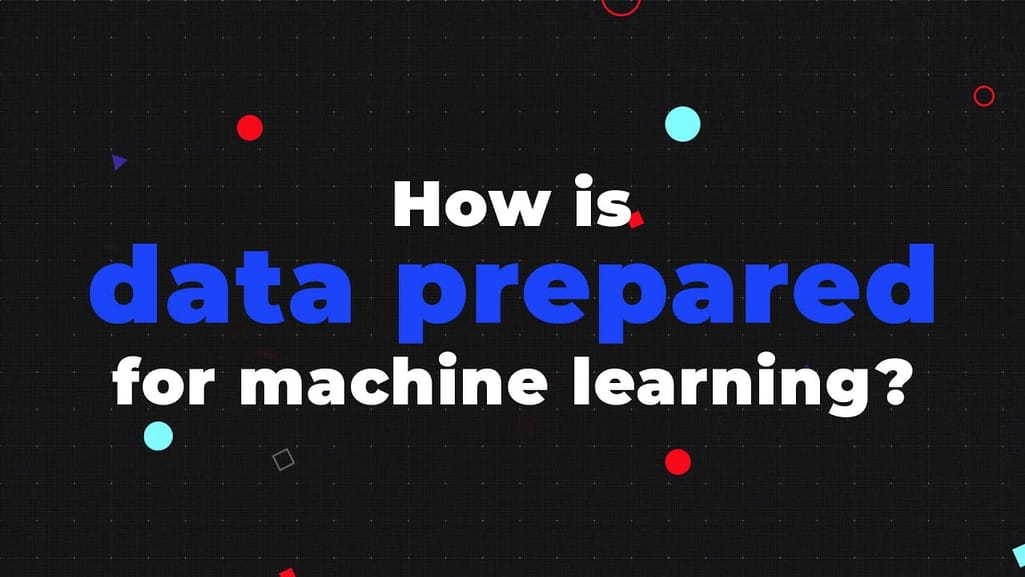

How data is prepared for ML projects in 14 minutes
Collecting and maintaining this data can be challenging for the vacation rental industry, particularly for smaller property owners who may not have the resources or expertise to manage large datasets.
Yakir Saadia, a co-founder and CEO at Paraspot AI, confirms, “Accessing the data is a big complication. But there are a lot of other bottlenecks like annotating data, training models on it, and doing all the tweaks to fine-tune your models and fit them perfectly for your use case. And that's a lot of work and training, even while you're upgrading things.”
Way to tackle the problem. To address the data challenge, businesses should focus on collecting relevant information from various sources, creating a centralized repository, and cleaning and preprocessing the data to ensure quality. Additionally, leveraging open-source data and tools can help fill gaps in data availability, while data labeling and annotation are crucial for supervised machine learning models.
“Addressing the challenges of using AI in short-term rentals primarily involves data management,” Yakir Saadia explains, “My recommendation is to begin by exploring open-source solutions and data sets, which can serve as a robust foundation. This allows you to initiate the process and accumulate your own data.”
Read our article about short-term and vacation rental data sources and analysis.
Integration with existing systems
Adopting AI-driven solutions may require integrating existing property management systems (PMSs), reservation platforms, and other tools property owners and managers use. This can be a complex and time-consuming process, which may deter some businesses from embracing AI technology.
Gernot Zechner from AJL Atelier shares his thoughts on the issue: "Highly localized businesses often lack the capacity for in-house technology development. Although off-the-shelf solutions exist, they lack interconnectivity, requiring significant time and effort to upgrade the tech stack. Additionally, high fragmentation among property managers makes it challenging for tech companies to balance acquisition costs, as smaller managers cannot require extensive sales or onboarding processes."
Way to tackle the problem. To overcome the challenge of fragmentation and disjointed systems, businesses should prioritize API-based integration, utilize middleware or integration platforms, collaborate with experienced technology partners, and select solutions designed for interoperability. Additionally, adopting a gradual implementation approach, starting with a pilot project, can help streamline the integration process and minimize disruption to the business.
Skillset gap
Many property owners and managers may lack the technical skills and knowledge required to implement and manage AI-driven solutions effectively. This can lead to a reluctance to adopt new technology, as they may feel unequipped to handle the challenges associated with AI adoption.
Way to tackle the problem. Property owners and managers can address the skillset gap through training programs, workshops, or online courses. Additionally, partnering with AI solution providers that offer comprehensive customer support and user-friendly interfaces can ease the adoption process and mitigate the challenges associated with AI adoption.
Jumpstart challenge
Implementing AI solutions often requires a significant initial investment in terms of time, money, and resources. Property owners and managers may be hesitant to make this investment, especially if they are unsure about the potential return on investment or long-term benefits of AI adoption.
Arne Reichelt and Marco Velten from AristanderAI comment on this, "Traditional STR AI-driven profitability management tools, relying mostly on classic machine learning techniques, face high hurdles in finding profitable pricing models due to their inability to leverage unstructured data, leading to worse predictions. Consequently, many revenue opportunities remain untapped, and the learning curve stays flat, often requiring 1-2 years to realize any measurable competitive advantages that impact short-, mid-, or long-term business success."
Way to tackle the problem. To address the jumpstart challenge, STR businesses should focus on selecting AI-driven solutions that offer quicker onboarding and faster results. This can be achieved by partnering with solution providers prioritizing ease of implementation, offering pretrained models tailored to the industry, and providing ongoing support and guidance throughout the adoption process.
Black box challenge
AI algorithms can often be perceived as a "black box," meaning that their inner workings are not easily understood by nonexperts. This lack of transparency can lead to skepticism and reluctance to adopt AI-driven solutions, as property owners and managers may not fully trust the recommendations generated by these systems.
Roy Firestein of Autohost comments, “People don’t trust AI mostly because of the explainability issue, and that’s an area of research in AI on how to make models explain the reasoning behind the recommendations and predictions they provide.”
Way to tackle the problem. There are some ways to address the problem in the works.
Arne Reichelt and Marco Velten from AristanderAI share their company's experience, "AristanderAI has developed an explainability feature, showcasing the weighing of each decision-contribution variable for every single pricing decision – presented in an understandable and user-friendly way. This results in game-changing transparency of deep learning algorithms."
Roy Firestein from Autohost believes that LLMs such as ChatGPT can contain a solution to explainability merely in the way they work: “ Now, large language models completely transformed how research is being done: They can explain to you why they arrived at a certain conclusion if you ask them. ChatGPT is a good example here. Is it accurate? Not yet.”
Transparency promotes the adoption of explainable AI-driven solutions compared to traditional black-box approaches.
The future of AI in the STR industry
In the near future, several key trends are expected to shape AI in the short-term rental industry.
Wider adoption of AI-driven solutions. As AI technologies mature and become more accessible, many property managers and STR businesses will adopt AI-driven pricing, maintenance, and personalization solutions.
Adir Ron, an CMO at Duve, says, “We’re currently seeing in the STR space that many businesses are eager to try and adopt AI tech into their daily operations. However, apart from utilizing ChatGPT, actually integrating with AI tech is a complicated feat, as it requires getting the models trained, setting them up, and connecting to existing infrastructure - all together.” He continues, “With that being said, many businesses are starting to look at external “off the shelf” products which already did the heavy lifting, allowing STR business owners to focus on a short and easy implementation and on getting the most out of AI technology.”
Responsible AI and transparency. With the increase in AI adoption, there will be a growing focus on ensuring responsible AI practices and explainable AI, addressing privacy, fairness, and accountability concerns.
Large Language Models (LLMs). As more companies recognize the benefits of LLMs such as GPT-4, they will likely incorporate them in various tasks, including customer support, content generation, and sentiment analysis to enhance efficiency and guest experience.
“The potential of large language models is enormous,” says Roy Firestein of Autohost, “This is a new revolutionary technology that will transform everything that we take for granted. Some things will stay the same, but most things will change.”
Gernot Zechner from AJL Atelier also comments on this, "Large OTAs possess the knowledge and engineering capacity, having used machine learning models for a while. However, this is an inflection point; even the strongest players must work hard to stay relevant. As technologies like ChatGPT evolve, they'll change not only interfaces, content, and algorithms but also how guests book trips. Soon, these AI tools will plan customized itineraries in seconds and book entire trips in a fraction of the time. With live data, questions like, 'Can you book this place for a cheaper rate?' become a logical next step."
Arne Reichelt and Marco Velten from AristanderAI also agree with the great influence of LLMs, saying, “ChatGPT will shake up every industry it touches — first in the form of concrete NLP advances (sentiment analysis, etc.), then in implementation-specific advances (faster PMS integration, API development), and finally in the slow dissolution of the user interface — or, user interfaces as we currently know them. Regarding conversational AI, we see LLM solutions being deployed within the year as a personalized concierge throughout the customer journey and hyper-personalized support.”
Collaboration between AI solution providers and industry players. Partnerships between AI solution providers and property management companies or platforms will likely become more common, driving innovation and fostering the development of industry-specific AI applications.
Numerous industry participants have already begun leveraging AI capabilities. For instance, Breezeway, a property operations platform for short-term rentals, has integrated ChatGPT-powered AI tools into its system. Utilizing ChatGPT, the platform can access and interpret Breezeway property profiles, reservation data, and Breezeway Guides, including WiFi instructions, house rules, property manager standards, directions, local restaurant recommendations, and parking availability.
As Gernot Zechner from AJL Atelier points out, “There are already many newcomers that plug into ChatGPT and promise to improve some element of the guest or host journey. This is just the first wave, and let's see how many real innovations emerge. However, I have no doubt that there will be a huge shift in how asset owners, operators, and guests will interact.”
AI-powered smart homes and IoT integration. Integrating AI with IoT devices and smart home systems will enable property managers to automate various tasks, enhance energy efficiency, and improve the overall guest experience.
In conclusion, the future of AI in the short-term rental industry is poised for rapid growth and innovation. As AI technologies continue to advance and become more accessible, they will reshape the way property managers operate and guests experience their stays. By embracing AI-driven solutions, the STR industry can achieve higher efficiency, personalized experiences, and sustainable growth, ensuring its ongoing success in the years to come.
